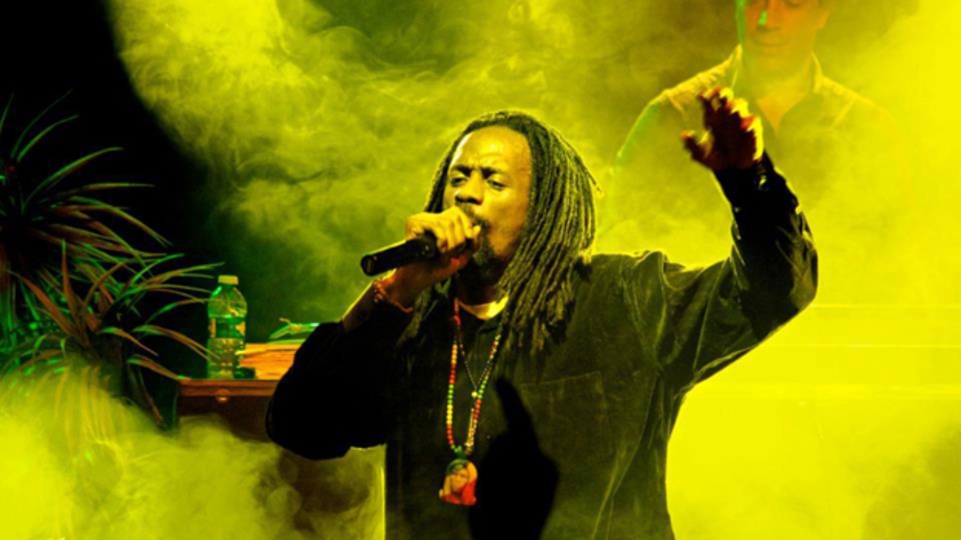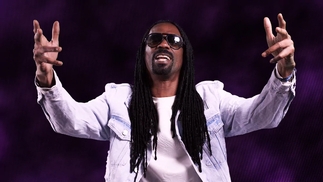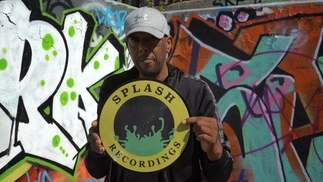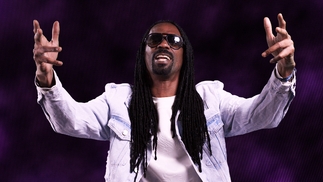EXCLUSIVE: GENERAL LEVY'S 'INCREDIBLE' JOURNEY
The ragga jungle MC talks about his part in the jungle/drum & bass split

Twenty years ago, the jungle scene was in its infancy. The darker strain of hardcore pursued by artists like Goldie’s Rufige Kru, Andy C’s Origin Unknown and Doc Scott’s Nasty Habits and lots more — in contrast to the toytown rave of happy hardcore — was lifting the scene off into the phuture, and on the other hand there was also the ragga jungle sound characterised by the frenetic frenzy of Shy FX’s ‘Original Nuttah’ featuring UK Apache.
The ragga dancehall sound popularised by Jamaicans such as Buju Banton and Shabba Ranks had taken off in the UK, but a lot of black/white youth preferred going to raves rather than dancehall events. It was only a matter of time before ragga fused into jungle, and several big tunes came out sampling ragga MCs.
The jungle raves got big, MCs started to become more like the public faces of the scene — with the DJ/producers in the background — and after ignoring jungle for a couple of years the media suddenly wanted a piece of it in 1994, when it became too big to overlook.
General Levy had started out with local soundsystems in North-West London like Java [Nuclear Power], Vigilante and TipperTone. He started chatting on the mic while still at school, and came second in an MC competition in 1986 which spurred him on to take up the art seriously — taking a lot of influence from Jamaican dancehall soundsystems and artists.
“I came more from an era when it was like DJ and MC running the place, like Yellowman and Beenieman and Eek-A-Mouse,” General Levy tells DJ Mag. “I was definitely inspired by these kinds of people, and also English soundsystems like Saxon, Papa Levi, Smiley Culture, Tippa Irie, Macka B. Basically putting all these influences together and developing my own character.
“I came with my own style, a hiccup style, which gave me my own signature, so basically I incorporated a lot of influences and put in a bit of my own flava — and that’s how I became General Levy,” he explains.
General had reggae albums out like ‘The Wickeder General’ and ‘Double Trouble’ with Capleton in the late '80s/early '90s, and ended up having quite a lot of dancehall success. Fledgling jungle producer M-Beat then approached him to do a track, as he’d been sampling Levy’s vox in his own tracks previously. “It was a new venture for me, and a new vibe for these guys,” says General. “We put it together and made a song – ‘Incredible’.”
The success of ‘Incredible’ was, well, incredible. Along with Shy FX’s ‘Original Nuttah’, it smashed it at 1994’s Notting Hill Carnival and then smashed into the Top 10 of the UK charts. He started playing huge shows, the media came calling, but when General Levy was featured in style mag The Face he let his mouth run away with him a tad. “I run jungle at the moment,” he reportedly said. “I came along and bigged up jungle. I took it national.”
In the close-knit London jungle community, which prided itself on the fact that no one individual was bigger than the scene, there was outcry. A committee was formed of leading DJ/producers to deal with the fact that the focus of the scene was shifting to spotlighting the MCs, and ‘Incredible’ was banned by the Committee — as was any of its members performing on the same bill as General Levy. He was blacklisted, and it has adversely affected the rest of his career.
The incident forms a crucial time in the development of drum & bass — basically when the more MC-led jungle split off from what started to be called drum & bass, which was more concerned with painting soundscapes musically.
So what does General Levy have to say about it all 20 years on? “The Face interview was a misinterpretation, really,” he says. “We did a concert, and I basically said to the guy ‘Jungle is a UK thing, it was born in the UK, we created this’. I was dealing with a crowd of people, there was about 2000 people there, so it was a statement that was made to say to the people, the public, that this was our music. Other countries have got hip-hop or reggae, and now we’ve finally got our own thing that was organically born in England. You know what I mean?
“But the way it was interpreted in the magazine was that I was saying I made it, I created it, me me me,” he continues. “It was a misinterpretation taken out of context.”
General makes the point that he was interviewed immediately after a big 2000-capacity gig with M-Beat at Walthamstow Assembly Halls in east London. “Was I misquoted? It was definitely a misinterpretation, it depends on how you read it,” he says. “It was a really exciting moment for me as an artist, it was definitely overwhelming. I was hype, you know what I mean? And I’m 22-years-old, 21, 22, so of course I’m gonna be... y’know, and I’m saying ‘Bwoy, this is great music, we made this music, we should be proud of it’. I think the way he took it [the journalist] was turned around.

“Also, there was a lot of people who didn’t want us to do well as well, and used it — instead of what we really wanted to say,” he continues. “I’d never say that cos I don’t play an instrument. I don’t play drums, how am I going to create music if I don’t even play drums, I don’t even play piano, I don’t know why I’d be so stupid to say that I made something? I’m an MC.”
DJ Mag points out that there was a move at the time to focus in on DJ/producers making instrumental sample-based music, rather than providing the backing for raggamuffin MCs. “Well, of course there was that side of it, a lot of people used that statement to try to scapegoat me, to make me look like the bad guy,” Levy says. “It was like a sacrifice. It was like, we want to keep this thing instrumental. I didn’t really understand that at the time, cos I was a reggae man coming from reggae music, so I didn’t really understand this thing about not wanting any vocals on a track, wanting to keep it instrumental — I didn’t understand that concept at all.”
He starts talking about how he was approached by M-Beat and Renk Records and agreed to the ‘Incredible’ project. “It wasn’t like I was looking to make the track,” he says. “But there was definitely a lot of people who didn’t want vocals on the tracks. So I maybe stepped on some people’s toes unintentionally and unknowingly, but they then used that statement and twisted it and turned it around to give us a bad name. Assassinate our characters.”
DJ Mag starts talking about the Jungle Committee, essentially formed by some of the big DJ/producers at the time to work out how to deal with him. “I didn’t know about all these things until years later,” he says. “Now there are books written about it, I was round this place one time and this guy pulled out about three books written about this whole topic. I couldn’t believe it. Even now I’m still a bit bewildered about what it was all about. I just chat on the mic, but it caused a lot of controversy. It was ridiculous that there was a whole committee’s worth of stuff, ridiculous — that’s totally what dampened the scene.
“Am I sorry the whole affair happened? Well yeah, it was just ridiculous. It made me more famous, to be honest. If you look at the positive side, all press is good press. ‘Incredible’ got in the Top 10, and it probably would’ve got to No.1 if it wasn’t for that controversy.”
Pressure from the Committee at the time was strong enough that General issued an apology to The Face. “No one individual runs any type of music,” he stated. “I am but one voice trying to further the cause of black music in this country.” What would he like to say to people in jungle/drum & bass now about his words back then?
“I think people understand that it was a misinterpretation,” he says. “Have I spoken to any of the main people since? Well, I don’t know who these people are, to be honest, cos nobody ever ever approached me face to face to say, ‘Hey, I’ve got a problem with you’. It’s always been shadows, I’ve never been approached by anybody.”
He talks about how he’s subsequently worked with people who were previously supposedly against him, and how he’s decided not to be negative about the whole ‘Incredible’ affair. He then says how he received an apology from MC 5-0 on the radio, and thinks that a lot of those ostracising him at the time have probably grown up now and have realised that the whole 'Incredible' affair was silly.
“Now it’s just down to the way I deal with it, how I handle it — I forgive, but I don’t forget,” he says. “You have to be careful. Even now, it’s made me a different person. It affected me in many ways. It was depressing definitely, but I always kept busy, kept on the road and stuff like that. I rode the tide, I rode the wave and I got through it, and they say ‘What doesn’t kill you can only make you stronger’.”
Being effectively blacklisted turned General into an international artist, he says. “This situation is what pushed me abroad, definitely. I’ve got a big big following abroad now, I’ve been going abroad for the last 15 years, because of the hostility that that situation brought to my name in the UK. Quite a few people didn't want to deal with me.
“A lot of people were directly jealous of me, cos you have to understand — ‘Incredible’ set a standard, it was a big tune, a serious hard tune,” he continues. “The production of the tune with M-Beat’s input as well, it set a standard of delivery that a lot of people didn’t want to have to reach. I reckon a lot of people thought, ‘Let’s get rid of this tune and leave it on the doormat’. I think it was a tune that was hard to compete with at the time — that’s why it’s still standing now.”
He suggests that the Committee had to kill ‘Incredible’ to make way for their own material to come through, and rightly questions the dubious term ‘intelligent jungle’ — “so what was the other jungle, stupid jungle?” He believes that the controversy didn’t do anything for the scene. “It was a mess. They destroyed the scene, they destroyed the karma. Jungle was happy music, know what I mean?” he says. “Having a good time, bringing people together, and they brought politics into it.”
The controversy stressed General out big time, he tells DJ Mag. “Anyone who saw me in them times knows I was stressed out,” he says, “I went through a lot of depression. I went through a lot of stuff.”
He talks about the situation leading to him breaking up with the mother of his daughter, and him getting dropped from London Records as well. “They got scared; ‘Oh god, how are we gonna market him, everybody hates him!’ So I lost a lot of money, a lot of my career I’ve lost through being blacklisted. Most people won’t know how much I lost — only I know, and my family. Even with the payment for ‘Incredible’, I was never paid the full money for the tune. Crazy.”
He talks about how he still does ‘Incredible’ live, that he originally wrote the song in 1993 as a reggae cut, and how the fact that ‘Incredible’ was so big kept him going. “Now I’ve got myself back up and I’m in a better position than I was when I did ‘Incredible’,” he believes. “It’s been a rollercoaster, and I’ve had a rebirth, y’know? I’ve had to rebuild my life — privately and publicly. I lost my reputation, with a lot of people looking at me bad. Now that’s all kind of been washed away.”
DJ Mag starts talking about bragging in US hip-hop, and how previously feuding parties later ended up being pals. “In England it was different, there was a real hatred, man,” he says. “Tupac and Biggie are both dead, remember — so there was less chat and more bullets. Over here there was more chat and less bullets — ha ha ha.”
Now General Levy has a new album out, ‘Forward’, for which he’s hooked up with Italian producer Bonnot, mainly known for his work with Dead Prez and also with Italian hip-hop group Assalti Frontali. “They’re a big Italian socially aware band, political, kind of ‘Fight the system’, kinda like Public Enemy originally,” says Levy. “He has his roots in that revolutionary vibe.”
Taking in happy lighters-up dubwise jungle, dancehall, digidub, bashment, conscious breakbeat and more, the 'Forward' album is a suitable reintroduction for General Levy into the UK scene. “Choo choo! Like a train, General Levy come again,” runs the first track on the album — a statement of intent. A lot of water has passed under a lot of bridges in the past 20 years. General Levy seems pretty much repentant for what he said back then that was subsequently “misinterpreted”. Shouldn’t the whole drum & bass scene now welcome him back into the fold?





